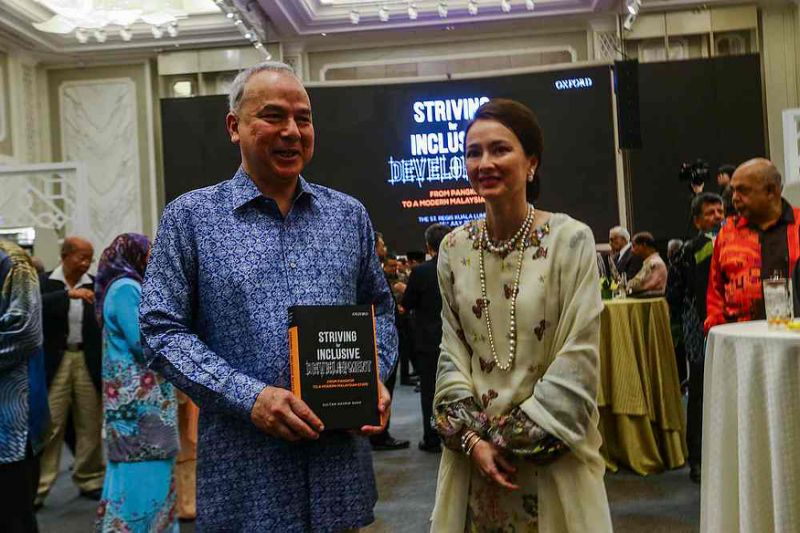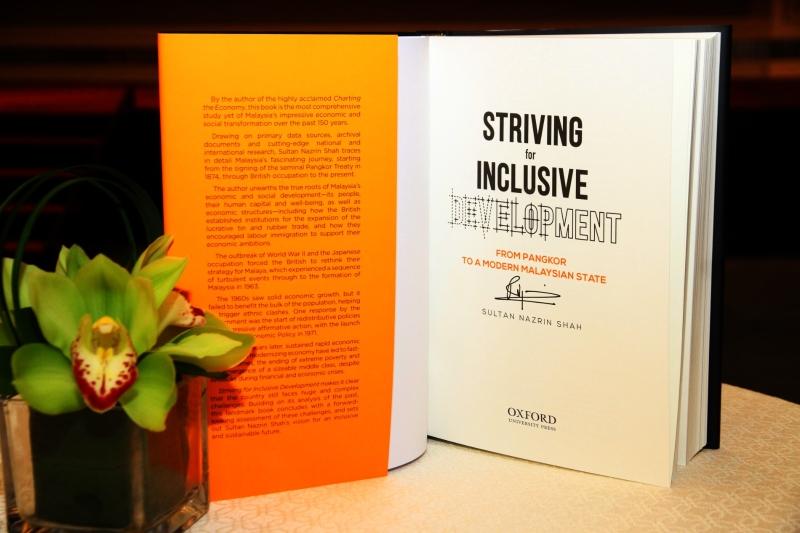Where there is no vision, there is no hope
“I’ve spent many nights squinting at large books, but with words in such small print that I needed to start wearing glasses before I completed the book! On a healthier note, though, I believe I have found new perspectives on Malaysia’s history”
The excerpt is contained in the words of the HRH Sultan Nazrin Muizzuddin Shah of Perak at the launch of his second book in Kuala Lumpur in July 2019. This is his second highly acclaimed publication, the first being titled “Charting the Economy: Early 20th Century Malaya and Contemporary Malaysian Contrast“, published in January 2017.
The task of a historian is often said – is not to judge but to explain
Sultan Nazrin, who is also the deputy Yang di-Pertuan Agong, said he had tried his best to remain objective and impartial when writing the book that touches on the evolution of what is now Malaysia from the time of the Pangkor Engagement in 1847.
Striving for Inclusive Development therefore lends itself to the role of a timely vision statement for the next stage of Malaysia’s growth, particularly in its concluding chapter, which outlines five major challenges the nation must surmount in the years ahead.
This vast landscape is covered in five parts that take up a substantial 560 pages book titled Striving for inclusive development: From Pangkor to A Modern Malaysian State was nearly two decades in the making and drew on primary data sources, archival documents, as well as cutting edge national and international research.
However, at the same time his book makes it clear that despite its achievements over the past 150 years, Malaysia still faces huge and complex challenges.
Analysing on what Malaysia has faced historically, Sultan Nazrin concluded his book with a forward-looking assessment of the challenges before the nation and set out a vision for an inclusive and sustainable future.
“The future design of affirmative action policies and programmes needs to be based on firm and fair observance of the balance of interest among all communities as provided for in the Federal Constitution,” he contended.
His work seeks to unearth the true roots of Malaysia’s economic and social development — its people, their human capital and well-being, as well as economic structures — including how the British established institutions for the expansion of the lucrative tin and rubber trade, and how they encouraged labour immigration to support their economic ambitions.
As might be expected, the book launch ceremony was attended by scholars and dignitaries who came not only from Kuala Lumpur but also from special universities around the world such as renowned development economist, Professor Han Cambridge University’s Joon Chang and Emeritus Professor Peter Drake, colonial economists from Australia. Also present were the Perak Empress, Tuanku Zara Salim, former Deputy Prime Minister Tun Musa Hitam, former Chief of Police Tun Hanif Omar, former Chief Secretary-General Tun Ahmad Sarji Abdul Hamid and Attorney-General Tommy Thomas and senior ambassadors of several countries Asia and Europe.
My desire to read this remarkable book is because I have always been amazed by Sultan Nazrin & his dad, Sultan Azlan Shah especially their education background and vision. Sultan Nazrin himself holds a Doctor of Philosophy (PhD) in Political Economy and Government from Harvard University, USA.
And it is heightened as I recalled the words of Sultan Nazin’s words at his royal address :
“My book charts our country’s fascinating economic history over the past 150 years. It is a journey that demonstrates national perseverance, institutional changes, and indeed, a long-term ‘Striving for Inclusive Development.’
And that when Sultan Nazrin stated that he had “discovered a new point of view on Malaysian history”
Emeritus Professor Peter Drake’s views in his brief remarks during the launch: “This new book confirms his rare ability to collect substantial detail, and assemble it coherently, master it completely and write a most readable account. ”
He also considers the book as most compelling and complete, thoughtful and authoritative in understanding the history of the Malaysian economy.
In his quest to complete his book research, Sultan Nazrin himself, said that in the process of collecting materials for the book he had talked to numerous scholars and economic historians and economists and consulted experts across many disciplines. There have been a hundred visions and as many revisions.
Sultan Nazrin also recalled his “sweet experience of being a researcher”. I am sure many of us have experienced these as students preparing project papers or Masters thesis or Doctorate dissertation (PhD) or even many budding entrepreneurs doing researches before the start of their businesses ~ a sweet and ‘worthwhile’ experiences.
In my opinion, his ‘new point of view’ is to be formulated or responded to in the form of two layers of interpretation.
The first is written, the second is implied.
Firstly, the undeniable fact: Malaysia’s success and achievements stem from the total contribution of all members of its community. Borrowing the jargon of social science, this is an undeniable ’empirical’ statement.
Secondly, Seeking Inclusive Development. In my opinion, he is raising points to ponder on how these development being distributed throughout the nation.
Building on its analysis of the past, this landmark book concludes with a forward-looking assessment of these challenges, and sets out Sultan Nazrin Shah’s vision for an inclusive and sustainable future.
I am sure this extraordinary book will guide the leaders of each political party to start thinking hard and act on it accordingly.







